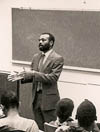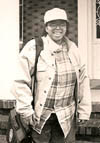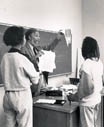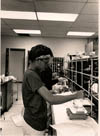Back To Clips |
||
(EDITOR’S NOTE: The five-part series below accompanied my six-week job exchange at Atlanta's Spelman College under a University of Wisconsin System grant I won as UW-Madison's media point man on diversity.)
 The view from Spelman: By Chuck Nowlen
Monday, Jan. 15 ATLANTA – It’s a beautiful Martin Luther King Day morning at historically black Spelman College, but what stands out most about the holiday here isn’t the hoopla I'm used to in starkly-white Madison, Wisconsin. It’s how hum-drum everything seems. No speeches, no rallies, no high-profile memorials. The few people milling about, in fact, just seem to be enjoying a warm, sunny day off. An outsider might find that surprising, considering Dr. King’s strong ties to this prestigious women’s college – where thousands once gathered to view the slain civil rights leader’s body as it lay in state in Sisters Chapel here, where Dr. King’s sister Christine King-Farris is a professor of education and where his youngest daughter Bernice once attended classes. Dr. King himself went to Morehouse College, Spelman’s brother institution across the street. Still, showboating those connections just wouldn't be right, according to the women of Spelman I interviewed for this story. The important thing about the holiday, they say, is not the hype, but the fruit of the Nobel Peace Prize winner’s work, which lives on in every corner of the campus every day. “Not to minimize the significance of the King holiday, but the things Dr. King did aren’t really a separate entity at a black college,” explains TaRessa Stone, Spelman’s director of public relations. “Here, those things are more organic to the school, more of an integrated part of the campus.” “Atlanta is also the eye of the storm when it comes to King Day activities around the world, and many Spelman students take part of what is going on downtown,” Stone adds. “It would almost be disrespectful to have something on campus that would compete with the King Center (for Nonviolent Change).” Spelman students find Dr. King’s ideas in their textbooks and homework assignments. They are urged to interpret his legacy in essays and art for a campuswide competition. The embodiment of Dr. King’s work is brought to Spelman often by trailblazers like Jesse Jackson, former Atlanta Mayor and U.S. United Nations Representative Andrew Young, poet Nikki Giovanni, jazz great Wynton Marsalis and Dr. Mae Jamison, the nation’s first black female astronaut. All year long, posters of Dr. King adorn Spelman offices, classrooms and dormitories. His image appears on student-union announcements and sorority party invitations. And when people here talk about the late civil rights leader, they never use only his last name. It’s always “Doctor King.” “Martin Luther King Day is not one day that you say to yourself, ‘I’ll remember’ because it’s something you’re aware of every day,” says Tara Lumpkin, a junior English major from Bollingbrook, Illinois. “The truth is that, even today, we’re still fighting for what Dr. King was fighting for. It’s there for us every day as a reminder.” Tayari Jones, another junior English major and a native of Houston, Texas, notes that the holiday has grown into “King Week” in Atlanta, with Hollywood stars, fireworks, big-time politicking in the name of Dr. King, and lots of TV camera crews. She worries about Dr. King’s birthday becoming too commercial. “From watching TV, you would think that Dr. Martin Luther King Jr. is the only black man who ever did anything,” she says, “and sometimes I think that’s deliberate on the media’s part. After all, Malcolm X doesn’t get all this attention, does he?” On the Thursday after King Day, one of the college’s weekly, mid-day convocations will feature faculty members’ recollections of Dr. King and a give-and-take talk on his legacy. Winners of the school’s “Beyond the Dream” essay contest will present their work, and there will be interpretive performances by children from the college’s nursery school, as well as by the Spelman Dance Theater. Today, a large group of Spelman students will join the throngs at Atlanta’s annual King Day march from Peachtree and Auburn avenues downtown to the King Center a few miles away. Some students will spend the day watching TV coverage of events, and some will take the time to reflect on the work that still needs to be done. For this, they need look no further than the blighted housing projects -- where a host of crippling social ills remain all too apparent -- that surround the Spelman campus. “The fact the King Day is a national holiday is a wonderful thing, but I don’t really consider it to be a major race breakthrough,” Jones says. “A higher percentage of black people still live below the poverty line, and racism is still a fact of life for us every day. Think about it: If we get so excited about this holiday that we start to think of it as a breakthrough, we’re in pretty bad shape, aren’t we?” Later in the morning, a Spelman security guard emerges from the Public Safety headquarters, then smiles and waves to four students lounging on the grass nearby.” “Happy birthday, ladies!” he shouts to them. “Happy birthday!” they reply. There is no doubt whatsoever about exactly what the greeting means.
 The view from Spelman: By Chuck Nowlen
ATLANTA -- When people at Spelman College talk about racism, they don’t talk about isolated slurs or occasional discrimination. They talk about “the system” – an institutional network of attitudes, assumptions and Catch-22s that invades every aspect of their lives. People on the Spelman campus make three points about racism in one way or another: * That the system remains a fact of life everywhere in America; * That it is a key reason why increasing numbers of young black students are choosing schools like Spelman; * That large, mostly white institutions will attract those young people only to the extent that modern racism is recognized for what it really is. “I think there is a tendency for white people to focus on racism as slurs or other things they identify as unusual behavior,” says Creative Writing Professor Pearl Cleage, former press secretary for Atlanta Mayor Maynard Jackson. “But what we really are is a racist and sexist country at every level, and unless we admit that, we are going backward.” Tracy Leary, a senior economics major from Milwaukee, says she saw the system clearly in high school when she transferred to a mostly white school and was placed in a slow-track math course. She had gotten all As in math at her previous school. Karlicia Dukes, a senior English major, also from Milwaukee, says she saw the system when she became the only black girl to make the cheerleading squad at her middle school and found out that two more-talented black classmates had failed. “I was from a more privileged background,” she recalls. “But they had gone to, you know, public, inner-city schools. It was like people thought they weren’t the ‘right’ kind of black person to represent the school.” And Camala Heyward, another senior English major from Los Angeles, says she just saw the system a few weeks ago when she and a friend were leaving an Atlanta jewelry store, only to be stopped by two white clerks who demanded their purses for an inspection. “After that,” she says, “we left the mall because we felt like we were being followed all the time by people who just saw two black girls out to steal something.” Faculty and students alike here see clear racism in, among other things: American history books with “only a paragraph or two” about black leaders and discrimination; year-end round-ups on network TV that fail to include a single black face; and polite smiles that mask a vague cold shoulder. They also see racism in words like “minority,” which they feel carries a subtle, yet profound message of disempowerment. Taken together, the elements of “the system” amount to a self-fulfilling prophecy of failure for many people of color, Cleage says. Cleage, who describes the system as born and perpetuated primarily out of fear, sees colleges and universities as key arenas for basic social change in America. But change can only occur when mainstream institutions accept it on the terms of people of color. This means incorporating the values and contributions of non-white cultures into mainstream curricula, rather than concentrating them into separate ethnic studies, she says. It means classes in all disciplines taught by men and women of color. It also means tolerance for the anger that the system engenders and a concerted effort to bring speakers to campuses who may not deliver speeches filled with “sweetness and light.” “I think white people allow a lot of terrible oppression to go on by saying, ‘I didn’t do it,’” Cleage adds. “The important thing is that they didn’t do anything to stop it, either.”
 The view from Spelman: By Chuck Nowlen
ATLANTA – Wearing a fluorescent green baseball cap, baggy shorts and orange, mosaic-patterned glasses, 22-year-old Tracey Lewis is Spelman’s resident cynic-comedian, a rap-inspired juke box of shock-therapy one-liners. Sometimes caustic, always outrageous, she is the lightning rod for the everyday frustrations of student life here – tough teachers, empty wallets, unforgiving administrators and all the rest. College students everywhere wish they could say the things that Tracey Lewis says. Here, just mentioning her name seems to make people smile. At the campus post office, when a clerk tells her she has to wait yet another day for a check she is expecting, an exasperated Tracey steps back in mock indignation and hisses, “I would just as soon CUT off my tongue and put it between two slices of WHITE bread!” While conducting a campus tour for a visitor, she points to a parked car owned by one of her professors. “Maybe I should put a banana in her tailpipe,” she says, “because if I ever see her again, I will SPIT in her eye!” Later in the tour, Tracey observes to the visitor that one of Spelman’s dormitories almost burned to the ground in 1970, and when asked how it happened, she calmly replies, “Some crazed, angry student such as myself probably set it on fire.” Some people here consider Tracey Lewis a genius, and few doubt her potential to achieve great things in life, given what she’s accomplished already. A senior majoring in English, she has an unabashed charm that won her a small, but memorable part in movie director Spike Lee’s second film, “School Daze.” (She played the counterperson at a chronically understocked Kentucky Fried Chicken store, who asks a customer if he wants white meat or dark meat, then announces after his order: “We don’t have any white meat today.”) Producers of the TV show, “A Different World,” which is based on Spelman, came to campus for an annual research trip two years ago and ended up offering Tracey a job as a writer after she graduates. Executive Producer Thad Mumford, who still consults with Tracey on script ideas, says he is continually impressed with her intelligence, knowledge of the entertainment business and her “definite spark.” “To me, Tracey embodies a lot of wonderful qualities about Spelman,” Mumford says. “I would quarrel with the notion that she is atypical, even if she is outspoken. I find her to be the type of student that I would love to have symbolize a school.” Tracey also is a principle editor of a book, “Stop the Violence: Overcoming Self-Destruction,” to be published in March by Pantheon Books. In discussing the project, which grew out of a rap music crusade against black-on-black violence, Tracey drops the jokes for a moment and speaks frankly about the impact the research had on her. She was especially touched while gathering about 300 black youngsters’ accounts of death and destruction in their lives. “They were stories about black kids being shot by other black kids as they walked down the street, or as they got out of their cars at the prom,” Tracey recalls. “I came away from it with the idea that white kids commit suicide and steal, but black kids kill each other. It’s two different results of the same phenomenon:” – she takes a breath and exhales deeply – “ANGST.” Pantheon Books, too, has offered the Gary, Indiana native a job after graduation. Spelman Public Relations Director TaRessa Stone, for whom Tracey works part-time during the school year, calls her “a brilliant student and a true American original” who illustrates the fact that Spelman is not “a cookie-cutter school.” “A lot of people would say she is just the opposite of the Spelman stereotype,” Stone says. “But at the same time, she is very much part of what we’re about.” Tracey offers a different view of her role at Spelman when a friend asks how she happened to meet the visitor she is guiding around the campus: “I HIT him with my car! It’s part of my community responsibility around here.”
 The view from Spelman: By Chuck Nowlen
ATLANTA – Maceo Dailey, a gentle, gray-bearded man sporting a herring-bone jacket, holds his black history class here in rapt attention with a quote from Carter G. Woodson, “the father of African-American history.” “If you make a man feel that he is inferior, you do not have to compel him to accept his inferior status, for he will seek it himself,” Dailey recites in mild, scholarly tones. “If you make a man feel that he is justly an outcast, you do not have to order him to the back door. He will go without being told, and if there is no back door, his very nature will demand one.” Dailey goes on to explain that Woodson, who in February, 1926 founded what is now Black History Month, didn’t get a bachelor’s degree until he was 32 – in part because black children in his 19th Century Virginia were only allowed to go to school for five months a year. “This should be mandatory reading for blacks and whites studying history,” Dailey says after reading another passage. “He clearly is an inspiration for us all.” Things have changed since the days of Carter G. Woodson, but Dailey knows that persistent and often subtle barriers are still part of everyday life for people of color in America. His teaching mission at Spelman is to give students a solid historical foundation for their lives, but also to help them recognize those barriers and overcome them. “Black students at predominantly white colleges often don’t have that kinship, that support system, which will allow them to deal with racism on a day-to-day basis,” says Dailey, who taught at Boston College before coming to Spelman. “I found it difficult to teach at a predominantly white college because often things that needed to be said weren’t said – out of a fear that they would be embarrassing to the black students or too challenging to the white students.” “But here it’s a different matter. Students are racially comfortable, and there is no worry about being assaulted or verbally abused. So the class discussion tends to be very open. We can talk freely about theory, but also day-to-day experience and the combination of the two.” Many American history classes leave glaring holes where the contribution of great African Americans should be, Dailey says, and the effect on the way students see themselves and their futures is profound. Dailey tries to fill those gaps with the inspirational lives and work of seminal scholars like Woodson, Robert Benjamin Lewis, William C. Nell and W.E.B. Du Bois. He also warns his students about the academic roadblocks they may face as modern scholars. Even at great universities, he says, many white professors – fearing reprisals if they are perceived as being too lenient – find it easier to give a low grade to a black student to even out the class grade distribution, rather than risk the wrath of an angry and influential white parent by giving their son or daughter a low grade they might actually deserve. Dailey also insists that at some predominantly white schools, African American Studies has become a “lip service” curriculum perceived by faculty, students and administrators alike as “a political football or something you do in your spare time.” “I tell my students, ‘If you go to graduate school at one of the ranking universities, here are the things you need to understand,’” Dailey explains. “There are things like the politics of the department. No one taught me about that when I was in school. There is also the politics of getting a book published, which often has nothing to do with the merits of the work.” A fall semester project “near and dear” to Dailey’s heart -- his combination classroom-basketball camp for youngsters living in Spelman’s neighboring housing projects – also gives some of his students a direct link between the lessons of history and the cold realities of modern city life. Sessions at the camp, which take place at Spelman’s Read Hall gymnasium, include at least 20 minutes of intellectual activity for the kids – building a simple radio, for example, piloting an airplane control simulator, or learning basic Swahili. “There were benefits I hadn’t even thought about,” says Dailey, a former basketball standout at Maryland's Towson State University. “Some of the kids still show up on Friday nights, even though we aren’t able to do it this term, and it gave a sense of significance to students in my class. They really got a sense of their role as models, inside the classroom and outside in the community.” Lois Moreland, chair of Spelman’s Social Sciences Division and the nation’s fifth black female political science Ph.D., says classes like Dailey’s – and there are many of them here at Spelman – go hand-in-hand with one of the college’s primary aims: to nurture a new generation of black female leaders. Adds Delitha Morrow, a senior English major from Atlanta: “There is a certain amount of empowerment just in knowing your own history. I mean, I read a story in Time magazine recently on some research indicating that Adam and Eve were black. I was flabbergasted because I always envisioned them as white.”
 The view from Spelman: By Chuck Nowlen
ATLANTA – When astronaut Charlie Bolden soars into space on the shuttle Discovery in March, a little bit of Spelman College will soar with him – a leather, Spelman-blue bookmark from the school’s College World Bookstore. He requested the memento last week at the suggestion of his wife, Jackie Walker-Bolden, a 1968 Spelman graduate who now works at a prominent Houston real estate firm. Lori Guy, an extremely polite junior from Chesapeake, Virginia, is a shining-star product of Spelman’s science program, which has attracted nearly 40 percent of the student body as majors – up from 16 percent in 1974. Her major is mechanical engineering, a field long dominated by white males. Guy, a 4.0 student, is one of 12 Spelman women selected for NASA’s Women In Science and Engineering (WISE) project, which pays up to 100 percent of educational costs and provides annual summer research opportunities at NASA centers. Last summer, Guy worked on computer-aided designs for space station monitors, antennas, thermal units and other equipment. She is a member of the National Society of Black Engineers and does part-time tutoring – all this while managing a heavy-duty course load in optics, statics, Fortran and differential equations. She also is a candidate to become the first Spelman winner of a Time Magazine College Achievement Award, which is given to 26 US undergraduates who show exemplary work both inside and outside the classroom. Why did she choose Spelman, with its shortage of state-of-the-art laboratories and equipment, over a place like North Carolina State University, which she had considered as a high school senior? She mentions WISE – one of about a dozen specialized science programs and organizations at Spelman – and the fact that the school is part of the Atlanta University Center, a six-college consortium that shares classes and facilities. But Guy focuses especially on the learning atmosphere at Spelman, which has nurtured her from an unsure freshman with poor study habits into a confident junior who organizes her time, but doesn’t think twice if she has to stay up all night to produce work that is not just good, but outstanding. “It’s hard to explain,” she says. “When you walk through that gate, people are waiting to show you that you fit in, that you’re going to make it. “The work is hard here, very hard. But your teachers know who you are. They take an interest in you as a person; and they won’t let you do just a little bit of work to get by.” Chemistry Professor Dr. Albert Thompson recalls, for example, a young student who was barely passing his class because of personal problems. The student came to his office, and the two talked frankly for more than an hour, finally agreeing on a strategy for change. The student did well in the class, graduated and recently got a master’s degree from the Georgia Institute of Technology. Dr. Pauline Drake, Spelman’s interim dean of academic affairs, says upgrading science facilities and faculty salaries are top priorities for President Johnnetta Cole. Faculty members interviewed for this story are heartened by the renewed financial resources being given to the science program. At the same time, they are nearly unanimous in adding that what really keeps them from moving on is their special role in helping Spelman student realize their dreams. Guy says her dream is a simple one: to break a longstanding stereotype. “I remember when I was working at a temporary agency,” she says, “and one man said that it must be hard for a girl to go into engineering. I was really insulted. That’s a really backward notion, because we’re capable of being scientists, engineers or anything else we want to be.”
|
||
Back To Clips |
||